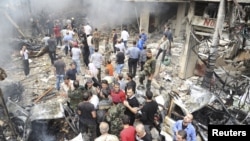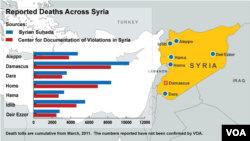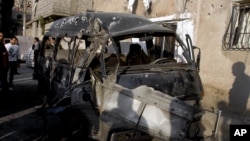CAIRO, EGYPT —
A Syrian activist group says a suicide car bomber has killed more than 50 Syrian soldiers in central Hama province. The attack comes as fighting continues across large sections of Syria, and as opposition leaders meet in Qatar to reshape the opposition movement.
Amateur video showed burning vehicles in a rebel-held town in Idlib province. Opposition sources say there were numerous casualties after government warplanes bombed the town's center.
Elsewhere, a car bombing in Hama province killed more than 50 government soldiers, according to the opposition Syrian Observatory for Human Rights. The Syrian government news agency SANA reported the blast, but said there were few victims. Syrian TV also reported deaths from an explosion in Damascus' Mazzeh district.
Heavy fighting was reported in and around Damascus, including at the Yarmouk Palestinian refugee camp.
In Cairo on Monday, Russian Foreign Minister Sergei Lavrov ended a 24-hour visit after talks at the Arab League and with Egyptian leaders. Lavrov dismissed a call by U.N.-Arab League envoy Lakhdar Brahimi for a U.N. Security Council resolution to establish a transitional government in Syria.
Lavrov also blasted Western and Arab states for what he said was “arming Syrians to fight” while “refusing to talk with the government.” Both Lavrov and Brahimi agree that there can be no military solution to the conflict.
Brahimi said that the only solution is a political process agreed to by all parties or else the future of Syria is bleak.
The main Syrian opposition bloc, the Syrian National Council, voted Monday in the Qatari capital, Doha, to broaden its ranks to include more activists and political groups from inside the country in the face of U.S. pressure to create a more representative leadership that could work with the West.
Washington and other foreign backers say they cannot boost aid to Syrian rebels unless the opposition is united and represents more diverse groups within Syrian society, including those fighting on the ground in Syria.
Later in the week, a separate meeting of the wider opposition movement will aim to form a united coalition that includes rebel fighters and others inside Syria.
Syria's Deputy Foreign Minister Faisal al Miqdad accused the opposition of following a foreign agenda.
He said that the opposition is submitting to the whims of the U.S., Israel and the West, which he said are hostile to the Syrian people and can only inflame the situation inside Syria.
Analyst Peter Harling of the International Crisis Group said the current attempt to unite the Syrian opposition under a new banner may have been influenced by U.S. politics.
"Now this move of trying to create a new umbrella makes sense to the extent that the SNC has never assumed that role, and is incapable of doing so. But I think it also ties in quite clearly with the U.S. presidential election agenda," said Harling.
Harling said the push from U.S. Secretary of State Hillary Clinton for a broader opposition structure is bound to meet some resistance, since Arabs, he said, are traditionally hostile to American interference in their affairs.
Amateur video showed burning vehicles in a rebel-held town in Idlib province. Opposition sources say there were numerous casualties after government warplanes bombed the town's center.
Elsewhere, a car bombing in Hama province killed more than 50 government soldiers, according to the opposition Syrian Observatory for Human Rights. The Syrian government news agency SANA reported the blast, but said there were few victims. Syrian TV also reported deaths from an explosion in Damascus' Mazzeh district.
Heavy fighting was reported in and around Damascus, including at the Yarmouk Palestinian refugee camp.
In Cairo on Monday, Russian Foreign Minister Sergei Lavrov ended a 24-hour visit after talks at the Arab League and with Egyptian leaders. Lavrov dismissed a call by U.N.-Arab League envoy Lakhdar Brahimi for a U.N. Security Council resolution to establish a transitional government in Syria.
Lavrov also blasted Western and Arab states for what he said was “arming Syrians to fight” while “refusing to talk with the government.” Both Lavrov and Brahimi agree that there can be no military solution to the conflict.
Brahimi said that the only solution is a political process agreed to by all parties or else the future of Syria is bleak.
The main Syrian opposition bloc, the Syrian National Council, voted Monday in the Qatari capital, Doha, to broaden its ranks to include more activists and political groups from inside the country in the face of U.S. pressure to create a more representative leadership that could work with the West.
Washington and other foreign backers say they cannot boost aid to Syrian rebels unless the opposition is united and represents more diverse groups within Syrian society, including those fighting on the ground in Syria.
Later in the week, a separate meeting of the wider opposition movement will aim to form a united coalition that includes rebel fighters and others inside Syria.
Syria's Deputy Foreign Minister Faisal al Miqdad accused the opposition of following a foreign agenda.
He said that the opposition is submitting to the whims of the U.S., Israel and the West, which he said are hostile to the Syrian people and can only inflame the situation inside Syria.
Analyst Peter Harling of the International Crisis Group said the current attempt to unite the Syrian opposition under a new banner may have been influenced by U.S. politics.
"Now this move of trying to create a new umbrella makes sense to the extent that the SNC has never assumed that role, and is incapable of doing so. But I think it also ties in quite clearly with the U.S. presidential election agenda," said Harling.
Harling said the push from U.S. Secretary of State Hillary Clinton for a broader opposition structure is bound to meet some resistance, since Arabs, he said, are traditionally hostile to American interference in their affairs.






